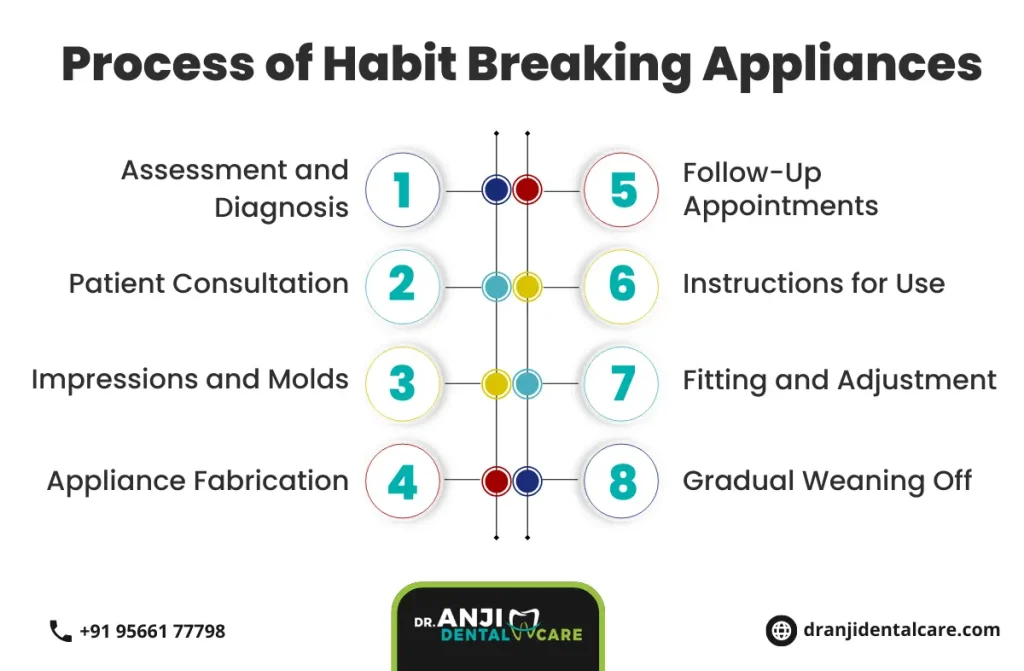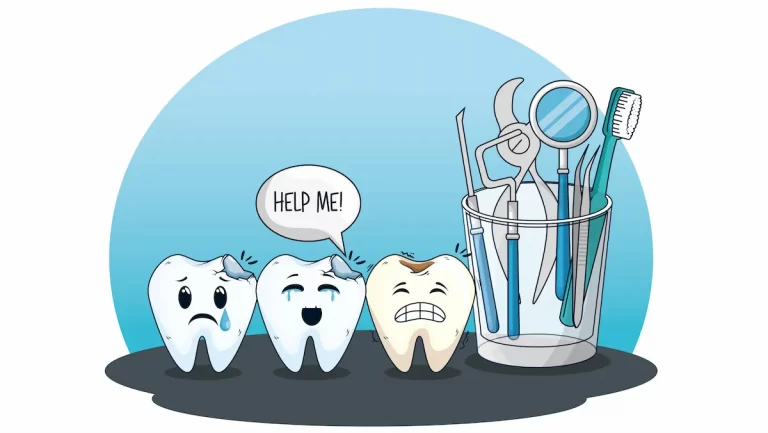Habit breaking appliances in Chennai are dental devices designed to assist in the cessation of harmful oral habits in children, such as thumb sucking, tongue thrusting, and prolonged pacifier use. These appliances work by creating discomfort or preventing the child from engaging in the habit, ultimately promoting proper oral development, and preventing potential dental issues. We aim to provide an overview of habit breaking appliances in Chennai, including their purpose, types, benefits, considerations, usage, and care.
Purpose of Habit Breaking Appliances in Chennai
The primary purpose of habit breaking appliances in pediatric dentistry is to eliminate detrimental oral habits that can interfere with normal dental development and lead to dental malocclusions, speech problems, and other oral health issues. These appliances are custom-made to discourage or prevent children from engaging in harmful habits, thereby promoting proper growth and alignment of teeth, jaws, and oral structures. By breaking these habits early on, habit breaking appliances in Chennai help prevent the need for more extensive orthodontic treatment in the future and support the overall oral health and well-being of children.

Habit Breaker Appliance Orthodontics
Habit breaker appliances in orthodontics are specialized devices designed to help children stop harmful oral habits, such as thumb sucking or tongue thrusting. These appliances, often custom-made, work by making the habit uncomfortable or less enjoyable, thus discouraging the behavior. Common types include fixed or removable devices placed in the mouth. Habit breaker appliances are crucial in preventing dental issues like misalignment, open bites, and improper jaw growth. Regular dental check-ups ensure the appliance’s effectiveness and monitor the child’s progress, promoting healthier oral development.
Issues of Habit Breaking in Dentistry
Here are some common issues related to habit breaking in dentistry:
Thumb or Finger Sucking: Thumb or finger sucking can cause misalignment of teeth, changes in jaw development, and speech problems. Dentists may use various methods, such as positive reinforcement, appliances like thumb/finger guards, or bitter-tasting solutions to discourage this habit.
Bruxism (Teeth Grinding): Bruxism can lead to tooth wear, jaw pain, headaches, and other dental problems. Habit-breaking techniques for bruxism may involve addressing the underlying causes, stress management, behavioral therapies, or prescribing occlusal splints or mouthguards to protect the teeth.
Nail Biting: Nail biting can damage the teeth, gums, and the skin around the nails. Dentists may advise patients to use bitter-tasting solutions, stress reduction techniques, or behavioral therapy to help break this habit.
Lip or Cheek Biting: Frequent biting of the lips or cheeks can cause tissue damage and sores. Habit-breaking strategies may include awareness exercises, habit-reversal techniques, or addressing underlying factors like anxiety or malocclusion.
Tongue Thrusting: Tongue thrusting is a swallowing pattern where the tongue pushes against the front teeth during swallowing, potentially leading to orthodontic problems. Dentists may work with patients to retrain their swallowing pattern, employ oral exercises, or use orthodontic appliances like a tongue crib.
Mouth Breathing: Chronic mouth breathing can affect dental and facial development. Dentists may collaborate with other healthcare professionals to identify the cause of mouth breathing and provide appropriate treatment, such as addressing nasal congestion or using orthodontic appliances.
Oral Hygiene Habits: Breaking poor oral hygiene habits, such as irregular or inadequate brushing and flossing, is crucial for maintaining oral health. Dentists may educate patients on proper oral hygiene techniques, provide demonstrations, and recommend tools like electric toothbrushes or interdental cleaners.
Types of Habit Breaking Appliances in Chennai
Thumb/Finger Appliances
Thumb/Finger Guard: A removable appliance placed over the thumb or finger, creating an uncomfortable sensation when the child attempts to suck.
Tongue Thrust Appliances
Crib Appliance: This is used by the paediatric doctors for habit breaking appliances as it consists of a metal crib-like structure placed behind the upper front teeth, preventing the tongue from thrusting forward during swallowing or speech.
Pacifier Appliances
Palatal or Crib Appliance: Similar to a crib appliance but designed to prevent prolonged pacifier use by creating discomfort.
Benefits of Habit Breaking Appliances
Habit breaking appliances in Chennai offer several benefits for children’s oral health and development:
Habit Cessation: These are used by the paediatric doctors for habit breaking appliances to help children overcome detrimental habits by creating discomfort or physical barriers, making it difficult or undesirable to engage in the habit.
Promotes Proper Dental Alignment: By eliminating harmful oral habits, habit breaking appliances in Chennai aid in the proper alignment of teeth and jaws, reducing the risk of malocclusions and the need for orthodontic intervention.
Supports Speech Development: Correcting habits like tongue thrusting can improve speech clarity and prevent speech problems associated with improper tongue placement.
Prevents Dental Complications: Breaking habits early on after the habit breaking appliances in Chennai can prevent potential dental issues, such as open bites, crossbites, or anterior open bites, which can impact oral function and aesthetics.
Considerations and Usage
Professional Evaluation: The pediatric dentist evaluates the child’s oral habits, dental occlusion, and overall oral health to determine the need for a habit breaking appliances in Chennai and recommends the most suitable type.
Customized Design and Fit: Habit breaking appliances in Chennai are custom-made to ensure proper fit, function, and effectiveness. The appliance should be comfortable for the child to wear and not cause any undue discomfort or pain.
Duration of Use: The duration of appliance use varies depending on the child’s age, the habit severity, and individual response. The pediatric dentist provides specific instructions on how long the appliance should be worn each day and monitors the progress.
Maintenance and Hygiene: Regular cleaning of habit breaking appliances in Chennai is essential to prevent bacterial growth and maintain oral hygiene. Caregivers should follow the dentist’s instructions for cleaning and storage.
Habit Breaking Appliance for Lip Biting
A habit-breaking appliance for lip biting is a specialized orthodontic device designed to discourage the habit of lip biting. This custom-made appliance typically fits inside the mouth and creates a barrier that makes lip biting uncomfortable, helping to reduce the behavior. It can be fixed or removable, depending on the child’s needs and the dentist’s recommendation. Regular dental visits are essential to monitor progress and make necessary adjustments. By preventing lip biting, the appliance helps avoid related dental issues such as tooth misalignment, gum damage, and irritation, promoting better oral health.
Cost of Habit Breaking Appliance
The cost of a habit-breaking appliance varies depending on the type and complexity of the device, as well as the specific dental practice. On average, prices in India range from ₹15,000 to ₹60,000. Customization to fit the child’s mouth and specific habit can influence the cost. Additional factors include the need for regular dental check-ups and potential adjustments. Dental insurance may cover part of the expense, so it’s advisable to check with your provider. Investing in a habit-breaking appliance can prevent future dental issues, making it a worthwhile consideration for long-term oral health.
Conclusion
Habit breaking appliances in Chennai at Dr. Anji Dental Care plays a vital role by promoting oral health and breaking harmful oral habits in children. By eliminating detrimental habits, these appliances support proper dental alignment, speech development, and prevent dental complications. Professional evaluation, customized design, and proper usage are key factors in ensuring the success of habit breaking appliances in pediatric dental care.
FAQs
What is the name of the habit-breaking appliance?
Habit-breaking appliances include thumb cribs, tongue cribs, lip bumpers, and bluegrass appliances. These devices are designed to prevent harmful oral habits by creating physical barriers or providing alternative behaviors, helping to protect a child’s dental health.
What age are habit-breaking appliances?
Habit-breaking appliances are typically used for children aged 5 to 12. This age range is crucial for addressing habits like thumb sucking and tongue thrusting before they cause significant dental issues.
How long does a habit appliance stay in?
A habit appliance generally stays in place for 6 to 12 months. The exact duration depends on the child’s progress and the specific habit being treated. Regular dental check-ups are essential to monitor its effectiveness.
Do habit breakers work?
Yes, habit breakers are effective. They make harmful habits uncomfortable or less enjoyable, reducing their occurrence. Consistent use and dental supervision help eliminate habits like thumb sucking, preventing related dental problems.
How does twin block work?
The twin block appliance corrects jaw alignment issues in growing children. It consists of upper and lower plates that guide the lower jaw forward, improving the bite. Worn full-time, it gradually aligns the jaws correctly with regular orthodontic adjustments.

